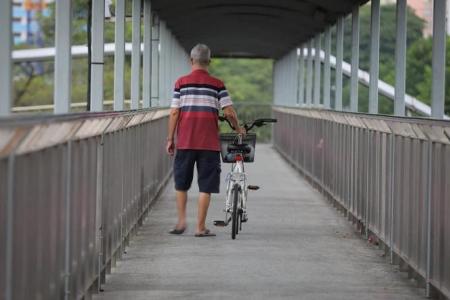Number of elder abuse cases likely to increase further: MSF
Family service centres (FSCs) here investigated 338 cases with elder abuse as the primary issue last year, an increase from 283 in 2020 and 232 in 2019.
But the Ministry of Social and Family Development (MSF) said the increase "can be attributed" to increased public awareness of family violence, and expects the number to increase further, as Singapore's greying population knows more of this issue.
"As Singapore's population ages, we anticipate an increase in the number of vulnerable elderly who are unable to protect or take care of themselves. This, coupled with increased awareness of elder abuse, is likely to contribute to an increase in number of elder abuse cases reported," said Ms Tabitha Ong, director of MSF's Adult Protective Service (APS).
But MSF added that the number of high-risk cases - typically taken up by the APS, Family Violence Specialist Centres (FVSCs) and Pave Integrated Services for Individual and Family Protection Specialist Centre (ISIFPSC) - remains stable. The FVSCs and ISIFPSC investigated 39 cases in the first nine months of last year, compared with 71 the year before. The APS investigated 120 cases last year, according to Ms Ong.
“Elderly victim-survivors are largely female and more than 90 per cent of perpetrators are the victim-survivors’ family members, including children and spouses,” she said, adding that elder abuse includes physical, psychological, emotional and sexual abuse, as well as self-neglect.
Physical abuse is the easiest to pinpoint, said Ms Katherine Baptist, the centre director of Montfort Care’s Kreta Ayer Family Services, with bruises a tell tale sign.
But psychological and emotional abuse are not as straightforward, she said, with elderly victims possibly becoming more withdrawn or show fear or aggression in the presence of the perpetrator.
Dr Kenny Cheong, a senior clinical psychologist with MSF's Clinical and Forensic Psychology Service, explained that some abused seniors have reported a loss of dignity, trust and hope in others. Psychologically, they may be more anxious and lonely.
Elder abuse may also result in serious and far-reaching consequences including injuries, disabilities and worsening of pre-existing health conditions, said Dr Cheong.
Despite the consequences on their well being, the elderly may be reluctant to speak up for themselves and lodge a report, said Ms Kristine Lam, Care Corner Project StART’s lead social worker.
"One big issue is culture. Victims of abuse think that as parents, they need to forgive and forget. Some people are scared of possible repercussions for their family members, they don't want them to get into trouble.
"They're also afraid of repercussions (to themselves). What will the perpetrators do to me if I report? Will they be more violent? Will they isolate me? There's a constant fear," she added.
One such case involved Madam Lee (not her real name), in her 80s, who was initially reluctant to file a personal protection order (PPO) even after she was insulted and harassed by her daughter and son-in-law.
She was also deprived of meals and her bank account was emptied out without her knowledge.
Eventually, she filed a PPO when the abuse turned physical.
Madam Lee's case is not unique.
To help assuage victims' fears, Ms Lam said social workers would discuss possible solutions with elderly victims while prioritising their safety, especially since the majority of reports are made by third parties.
If an elderly person is isolated and frail, it may be hard for them to seek help, Ms Baptist said, with members of the public playing a vital role in flagging out cases of abuse.
"My message to the public is if you're worried, just call the National Anti-Violence and Sexual Harassment Helpline and let the professionals investigate a little bit more," she added.
Mr Raymond Lai, 56, who has been volunteering with APS for three years, stressed the importance of public education to identify cases before they escalate.
"While we might hear of quarrels and fights happening next door, we tend to just mind our own business," he said.
"Many of these seniors, I would say, are lonely people. They may have families but they're often left alone. I encourage the public to show empathy rather than pity."
Ms Ong said MSF will "continue to monitor the trend in elder abuse cases and work closely with sector partners, hospitals, the police and the courts to detect cases of elder abuse, neglect and self-neglect to ensure elderly persons experiencing abuse and neglect receive timely help and support".
Efforts include the Break the Silence campaign, which focuses on educating the public on family violence, including through occasions such as the World Elder Abuse Awareness Day on June 15 each year.
Elder abuse victims or those who witness elder abuse can call the National Anti-Violence and Sexual Harassment Helpline at 1800-777-0000 to make a report.
If there is imminent danger to a person's life and safety, please call the police on 999 or SMS 71999.
Get The New Paper on your phone with the free TNP app. Download from the Apple App Store or Google Play Store now

